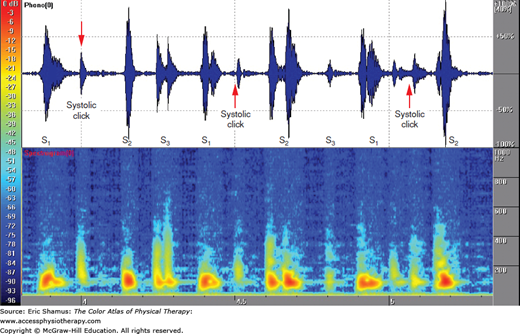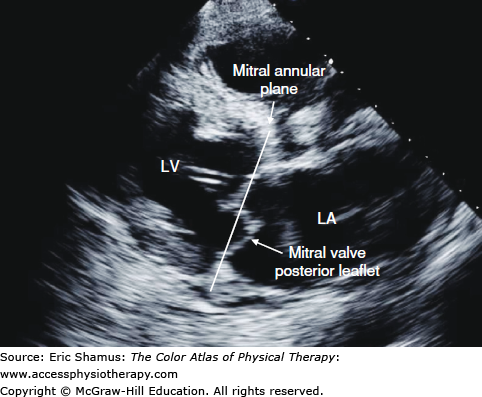Mitral Valve Prolapse

The cardiac echo image below demonstrates a mitral prolapse without regurgitation. Both the phonogram and spectrogram show a systolic mitral click and a diastolic S3 prominent during inspiration.

A 38-year-old woman presents with palpitations, anxiety, and dizziness. She states that nothing in particular has been causing her stress lately, but she feels her “heart racing.” Vitals are: Pulse: 84, Respirations: 18, Blood Pressure: 110/70, and SpO2% of 99%. On examination, there is an audible non-ejection click and a faint, late systolic murmur. On the musculoskeletal examination, there is a narrow anteroposterior chest diameter and a mild scoliosis. On echocardiogram, there is a 2.5-mm displacement of the mitral valve leaflet.

Question: What are some common impairments that might be seen with this patient upon further examination?
Potential answers:
A. Limited activity tolerance, impaired gait, impaired cognition.
B. Limited functional capacity, syncope, impaired gait.
C. Dyspnea during exertion and at rest, limited activity tolerance, limited functional capacity.
D. Dyspnea upon exertion only.
Answer with rationale: C. Dyspnea during exertion and at rest, limited activity tolerance, limited functional capacity. With severe mitral valve prolapse, congestive heart failure can be a complication.Dyspnea with exertion and sometimes at rest is a symptom of CHF. Certain forms of exercise or excessive exertion can overstrain the heart, worsening the effects of the prolapse. This means certain activities and functions may need to be limited.
For more information see Chapter 12: Mitral Valve Prolapse in The Color Atlas of Physical Therapy.
Create a Free MyAccess Profile
AccessMedicine Network is the place to keep up on new releases for the Access products, get short form didactic content, read up on practice impacting highlights, and watch video featuring authors of your favorite books in medicine. Create a MyAccess profile and follow our contributors to stay informed via email updates.